MHSAA NOW: The weekly newsletter
THIS WEEK
We roll into the busiest championship weekend of the 2021-22 school year with previews for our Girls & Boys Track & Field Finals and Lower Peninsula Girls Tennis Finals, along with coverage of eight championships awarded over the last two days in Upper Peninsula girls and boys golf and boys tennis. We also say good-bye to a Hall of Fame coach closing his career on the track Saturday, look back at one of the most incredible sprint performances in MHSAA history, and catch up with one of the state’s most highly-regarded baseball prospects in years.
Do you know a high school sports fan who would enjoy this weekly newsletter? Share this link to register on MHSAA.com and be added to the MHSAA NOW mailing list.
AROUND THE STATE
 Preview: Reunited Co-Champs, Title Streak Possibilities Headline Tennis FinalsMany of the strongest contenders are familiar heading into this weekend’s Lower Peninsula Girls Tennis Finals. But intriguing storylines could make all four tournaments especially memorable for the teams playing to finish on top. |
 Preview: 4 Team Championships, Many More Contenders at LP Boys FinalsThere are a number of knowns entering Saturday’s MHSAA Lower Peninsula Boys Track & Field Finals, as a number of stars are returning and looking to add to their past achievements. What’s more difficult to forecast than usual is how the team competitions will finish. All four divisions appear to have multiple serious contenders, and many more possible outcomes. |
 Preview: Opportunities Await for Standouts to Join All-Time GreatsWinners of 26 individual titles from the 2021 Girls Track & Field Finals will be back at Saturday’s Lower Peninsula championship meets hosted by Rockford, Ada Forest Hills Eastern, Kent City and Hudsonville Baldwin Middle School. Here is a glance at team contenders and individuals to watch in all four divisions. |
 Preview: Past Champions Filling Upper Peninsula Girls Track & Field FinalsAn extraordinary 16 individual champions from last season’s Upper Peninsula Girls Track & Field Finals will return to Kingsford this weekend seeking the same success and more. And only six of them are seniors. The star-studded meet will feature the final high school races for standouts like three-time champion Landry Koski from Rock Mid Peninsula and Houghton distance star Ingrid Seagren. |
 Preview: UP Boys Finals Feature Fierce Team Races, Statewide HeadlinersThere’s an excellent chance many statewide eyes turn to Saturday’s Upper Peninsula Boys Track & Field Finals at Kingsford High School. Start in high jump, where Menominee’s Brady Schultz is one of four athletes sharing the top performance in that event in Michigan this season. |
 Escanaba Edges Negaunee to Claim Anticipated Battle for Best in UPD1All season long, the Escanaba Eskymos and the Negaunee Miners were the top two boys tennis teams in the Upper Peninsula, seemingly on a collision course to fight for the Division 1 championship for the second-straight year. More from the Finals: Division 2 |
 Repeat Medalist Autore Leads as Islanders Start Next Championship TraditionThe Cedarville girls golf team won the Upper Peninsula Division 3 championship last season, and DeTour took the top honor in 2017. So it was only logical that the first-year cooperative program comprised of two schools would be a formidable favorite Thursday at Highland Golf Club. True to expectation, Cedarville/DeTour fired a 420 to win by 43 strokes. More from the Finals: Division 1 | Division 2 |
 It’s Championship Time for Badker, While Houghton Holds On for Team TitleFrom the Division 3 boys basketball championship game at the Breslin Center to the Great Northern Conference golf final at Escanaba Country Club, the story of much of Brady Badker’s senior year has been second place. That changed Wednesday afternoon, as Menominee’s Badker won the individual championship at the Upper Peninsula Division 1 Final at Sage Run Golf Course in Bark River. More from the Finals: Division 2 | Division 3 |
 Performance of the Week: Orchard Lake St. Mary’s Brock PorterOne of Michigan’s most highly-regarded baseball talents in years, Porter continued his dominating senior season May 20 with his fourth no-hitter of the spring – this time in a 4-0 win over Detroit Catholic Central in the Catholic High School League Bishop semifinals at Comerica Park. He struck out 16 hitters, upping his season total to 87 with only 17 walks over 42 innings. He’s 6-0 and has allowed only one earned run – and three total – this season. |
 Title IX at 50: Mumford Sprinter’s Magnificent 2006 Final Remains UnmatchedMichigan’s illustrious track & field history is filled with legends who have achieved glory at every race distance and in every field event. But the sprints arguably remain the featured attraction at any meet – and Shayla Mahan’s Lower Peninsula Division 1 Finals performance on June 3, 2006, at East Kentwood remains among the most glorious and awe-inspiring over nearly a century of MHSAA history. |
 Self-Taught Lutzke Leaving Williamston with Decades of Memorable LessonsIf it were possible to string together all of the moments that made Mitch Lutzke into a Hall of Fame high school track & field coach, the first half of the video would look like a one-man pentathlon. At most, the now-longtime Williamston leader brought into coaching a season of mostly-junior varsity cross country experience as a student at Albion High, and some additional knowledge gleaned from marrying a college All-American runner. |
GAME TIME
Upcoming MHSAA Tournament Schedule
Girls Golfs (UP) · Finals: June 1-4
Boys Tennis (UP) · Finals: June 1-4
Girls Tennis (LP) · Finals: June 2-4
Boys Track & Field · Finals: June 4
Girls Track & Field · Finals: June 4
Boys Golf (LP) · Finals: June 10-11
Boys Lacrosse · Finals: June 11
Girls Lacrosse · Finals: June 11
Girls Soccer · Finals: June 17-18
Baseball · Finals: June 18
Softball · Finals: June 18
MHSAA TV
For a complete list of all games and streaming options go to mhsaa.tv.
MHSAA Podcasts
This Week In High School Sports













 Several state parks in southern Michigan will host volunteer stewardship workdays in June. Volunteers are needed to help with removing invasive plants that threaten high-quality ecosystems or collecting native seeds for prairie restoration.
Several state parks in southern Michigan will host volunteer stewardship workdays in June. Volunteers are needed to help with removing invasive plants that threaten high-quality ecosystems or collecting native seeds for prairie restoration.
 It’s time to talk about your state forests.
It’s time to talk about your state forests.
 The DNR is hosting virtual public meetings to provide information on the state land review process and opportunities for feedback on recommendations on whether to keep, exchange or sell DNR-managed public land in 10 counties: Delta, Kent, Livingston, Menominee, Montcalm, Oakland, Ogemaw, Oscoda, Saginaw and Tuscola.
The DNR is hosting virtual public meetings to provide information on the state land review process and opportunities for feedback on recommendations on whether to keep, exchange or sell DNR-managed public land in 10 counties: Delta, Kent, Livingston, Menominee, Montcalm, Oakland, Ogemaw, Oscoda, Saginaw and Tuscola.
 For over 10 years, scientists have been assessing large, resilient ash trees for their tolerance to the invasive emerald ash borer, but they need your help to find more of these lingering ash trees in forested areas. Finding more of these trees will improve the USDA Forest Service ash breeding program, which is breeding native ash for increased resistance.
For over 10 years, scientists have been assessing large, resilient ash trees for their tolerance to the invasive emerald ash borer, but they need your help to find more of these lingering ash trees in forested areas. Finding more of these trees will improve the USDA Forest Service ash breeding program, which is breeding native ash for increased resistance.
 Sometimes the first step to getting involved is experiencing the resources for yourself! If you’re new to fishing, ORVing or exploring state parks, next weekend could be a good start to seeing all of Michigan’s valuable natural resources and great recreation opportunities and why the DNR, many partners and volunteers work so hard to keep our outdoor places healthy and beautiful.
Sometimes the first step to getting involved is experiencing the resources for yourself! If you’re new to fishing, ORVing or exploring state parks, next weekend could be a good start to seeing all of Michigan’s valuable natural resources and great recreation opportunities and why the DNR, many partners and volunteers work so hard to keep our outdoor places healthy and beautiful.


 The Michigan Department of Natural Resources encourages everyone to take advantage of “Three Free” Weekend – Saturday, June 11, and Sunday, June 12 – two full days when residents and out-of-state visitors can grab a fishing rod, ride the off-road trails and visit state parks and boating access sites, all free of charge.
The Michigan Department of Natural Resources encourages everyone to take advantage of “Three Free” Weekend – Saturday, June 11, and Sunday, June 12 – two full days when residents and out-of-state visitors can grab a fishing rod, ride the off-road trails and visit state parks and boating access sites, all free of charge. “We have three big reasons for you to enjoy some of Michigan’s best outdoor recreation opportunities,” said DNR Director Dan Eichinger. “Whether you’re already an avid outdoors-person or someone just beginning to explore all the options, our ‘Three Free’ Weekend makes it easy to discover a new hobby, visit a new park or introduce friends to an outdoor experience you love.”
“We have three big reasons for you to enjoy some of Michigan’s best outdoor recreation opportunities,” said DNR Director Dan Eichinger. “Whether you’re already an avid outdoors-person or someone just beginning to explore all the options, our ‘Three Free’ Weekend makes it easy to discover a new hobby, visit a new park or introduce friends to an outdoor experience you love.”
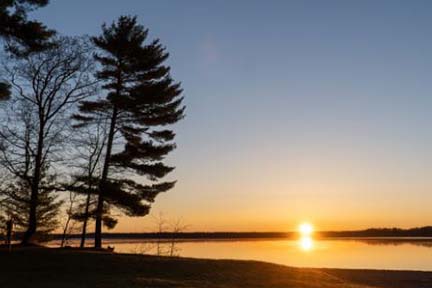

 Want to see more pictures like this, taken by Michigan state parks photo ambassador
Want to see more pictures like this, taken by Michigan state parks photo ambassador  Canada geese are a common sight on Michigan’s waters. In fact, they nest in every Michigan county, but are most common in the southern third of the state. You may even see and hear Canada geese all year in some parts of the state.
Canada geese are a common sight on Michigan’s waters. In fact, they nest in every Michigan county, but are most common in the southern third of the state. You may even see and hear Canada geese all year in some parts of the state.
 Step, stride and snatch up trash during the summer Adopt-a-Forest challenge, the week between World Environment Day (June 5) and Get Outdoors Day (June 11). We want to see how far Adopt-a-Forest can take us!
Step, stride and snatch up trash during the summer Adopt-a-Forest challenge, the week between World Environment Day (June 5) and Get Outdoors Day (June 11). We want to see how far Adopt-a-Forest can take us!
 To join, organize your volunteer team, clean up a forest area in need of help and tell us how many steps or miles it took the team to clean up the dump site. Record your steps using a fitness tracker, pedometer or your phone’s health app. When you’re out on a cleanup site, make sure to wear sturdy boots, gloves and outdoor gear appropriate for the weather.
To join, organize your volunteer team, clean up a forest area in need of help and tell us how many steps or miles it took the team to clean up the dump site. Record your steps using a fitness tracker, pedometer or your phone’s health app. When you’re out on a cleanup site, make sure to wear sturdy boots, gloves and outdoor gear appropriate for the weather.
 Widely known as a “living fossil of the Great Lakes,” the lake sturgeon is a big part of Michigan fishing lore. Don’t miss the chance to learn more about the species – and have a lot of fun – at The Friends of the St. Clair River’s 9th annual Blue Water Sturgeon Festival.
Widely known as a “living fossil of the Great Lakes,” the lake sturgeon is a big part of Michigan fishing lore. Don’t miss the chance to learn more about the species – and have a lot of fun – at The Friends of the St. Clair River’s 9th annual Blue Water Sturgeon Festival.
 When smoke and flickering flames blaze across the landscape, red trucks with flashing lights and teams of DNR firefighters are close behind. Wildland firefighters arrive at the scene of hundreds of wildfires each year, ready to protect. Units battled 274 fires that burned 2,379 acres of land in 2021.
When smoke and flickering flames blaze across the landscape, red trucks with flashing lights and teams of DNR firefighters are close behind. Wildland firefighters arrive at the scene of hundreds of wildfires each year, ready to protect. Units battled 274 fires that burned 2,379 acres of land in 2021.
 Instead of burning, consider other means of brush and leaf disposal such as chipping or composting.
Instead of burning, consider other means of brush and leaf disposal such as chipping or composting.